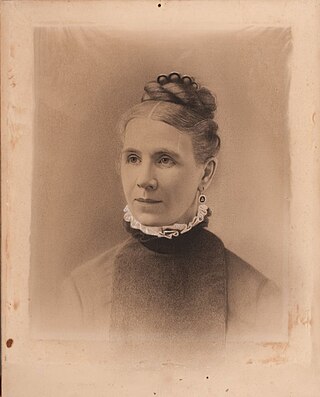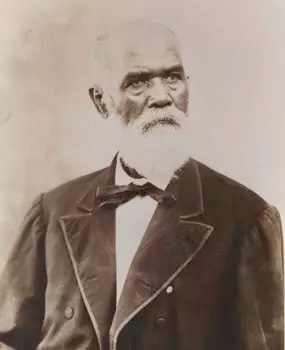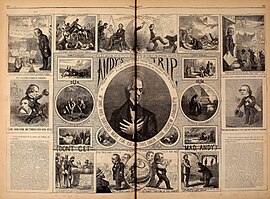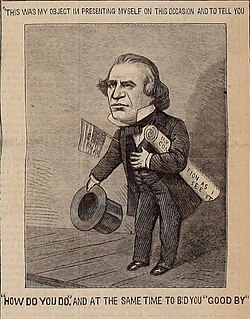
Andrew Johnson was the 17th president of the United States, serving from 1865 to 1869. He assumed the presidency following the assassination of Abraham Lincoln, as he was vice president at that time. Johnson was a Southern Democrat who ran with Abraham Lincoln on the National Union Party ticket, coming to office as the Civil War concluded. He favored quick restoration of the seceded states to the Union without protection for the newly freed people who were formerly enslaved as well as pardoning ex-Confederates. This led to conflict with the Republican-dominated Congress, culminating in his impeachment by the House of Representatives in 1868. He was acquitted in the Senate by one vote.

Thomas Nast was a German-born American caricaturist and editorial cartoonist often considered to be the "Father of the American Cartoon".

Harper's Weekly, A Journal of Civilization was an American political magazine based in New York City. Published by Harper & Brothers from 1857 until 1916, it featured foreign and domestic news, fiction, essays on many subjects, and humor, alongside illustrations. It carried extensive coverage of the American Civil War, including many illustrations of events from the war. During its most influential period, it was the forum of the political cartoonist Thomas Nast.

The 1866–67 United States House of Representatives elections were held on various dates in various states between June 4, 1866, and September 6, 1867. They occurred during President Andrew Johnson's term just one year after the American Civil War ended when the Union defeated the Confederacy. Each state set its own date for its elections to the House of Representatives. Members were elected before or after the first session of the 40th United States Congress convened on March 4, 1867, including the at-large seat from the new state of Nebraska. Ten secessionist states still had not yet been readmitted, and therefore were not seated.

The New Orleans massacre of 1866 occurred on July 30, when a peaceful demonstration of mostly Black Freedmen was set upon by a mob of white rioters, many of whom had been soldiers of the recently defeated Confederate States of America, leading to a full-scale massacre. The violence erupted outside the Mechanics Institute, site of a reconvened Louisiana Constitutional Convention. According to the official report, a total of 38 were killed and 146 wounded, of whom 34 dead and 119 wounded were Black Freedmen. Unofficial estimates were higher. Gilles Vandal estimated 40 to 50 Black Americans were killed and more than 150 Black Americans wounded. Others have claimed nearly 200 were killed. In addition, three white convention attendees were killed, as was one white protester.

Swing Around the Circle is the nickname for a speaking campaign undertaken by U.S. President Andrew Johnson between August 27 and September 15, 1866, in which he tried to gain support for his obstructionist Reconstruction policies and for his preferred candidates in the forthcoming midterm Congressional elections. The tour's nickname came from the route that the campaign took: "Washington, D.C., to New York, west to Chicago, south to St. Louis, and east through the Ohio River valley back to the nation's capital".

The presidency of Andrew Johnson began on April 15, 1865, when Andrew Johnson became President of the United States upon the assassination of President Abraham Lincoln, and ended on March 4, 1869. He had been Vice President of the United States for only six weeks when he succeeded to the presidency. The 17th president, Johnson was a member of the Democratic Party before the Civil War and had been Lincoln's 1864 running mate on the National Union ticket, which was supported by Republicans and War Democrats. Johnson took office as the Civil War came to a close, and his presidency was dominated by the aftermath of the war. As president, Johnson attempted to build his own party of Southerners and conservative Northerners, but he was unable to unite his supporters into a new party. Republican Ulysses S. Grant succeeded Johnson as president.

The inauguration of Andrew Johnson as the 17th president of the United States was held on April 15, 1865, on the third floor of Kirkwood House in Washington, D.C., following the assassination of President Abraham Lincoln. The inauguration marked the commencement of Andrew Johnson's only term as president. Chief Justice Salmon P. Chase administered the presidential oath of office.

This bibliography of Andrew Johnson is a list of major works about Andrew Johnson, the 17th president of the United States.

Martha Johnson Patterson was the eldest child of Andrew Johnson, the 17th President of the United States and his wife, Eliza McCardle. She served as the White House hostess during her father's administration and directed the restoration of the White House following the American Civil War. A newspaper article published at the time of her death stated, "'Too much cannot be said in praise of her many virtues.'...president Johnson once told a United States Senator—still living in Washington—that Mrs. Patterson 'was the only child he had who had been a comfort to him, or taken pride in his career.'"

Andrew Jackson, the seventh U.S. president, was a slave owner and slave trader who demonstrated a lifelong passion for the legal ownership and exploitation of enslaved black Americans. Unlike Thomas Jefferson and George Washington, Jackson "never questioned the morality of slavery." Existing records show that Jackson and his immediate heirs owned 325 enslaved people between 1788 and 1865. Jackson personally owned 95 people when he was first sworn in as U.S. president and 150 at the time of his death in 1845. Only 0.1% of white southern families owned 100 or more slaves at the time of the American Civil War.

Andrew Johnson, who became the 17th U.S. president following the assassination of Abraham Lincoln, was one of the last U.S. Presidents to personally own slaves. Johnson also oversaw the first years of the Reconstruction era as the head of the executive branch of the U.S. government. This professional obligation clashed with Johnson's long-held personal resentments: "Johnson's attitudes showed much consistency. All of his life he held deep-seated Jacksonian convictions along with prejudices against blacks, sectionalists, and the wealthy." Johnson's engagement with Southern Unionism and Abraham Lincoln is summarized by his statement, "Damn the negroes; I am fighting these traitorous aristocrats, their masters!"

Robert Johnson was the fourth-born child of Andrew Johnson and Eliza McCardle, a lawyer by profession, one-term Tennessee state legislator, Union Army cavalry officer during the American Civil War, and Secretary to the President of the United States. Johnson suffered from severe and chronic alcohol dependence. He died by overdose of alcohol and laudanum in the family home in Greeneville, Tennessee, six weeks after the end of President Johnson's term in office.

The Andrew Johnson alcoholism debate is the dispute, originally conducted amongst the general public, and now typically a question for historians, about whether or not Andrew Johnson, the 17th president of the United States, drank to excess. There is no question that Andrew Johnson consumed alcohol ; the debate concerns whether or not he was governing drunk, how alcohol may have altered his personality and disrupted his relationships, and if, when, or how it affected his political standing, and even his current bottom-quartile historical assessment. Less so today, but in his own time, Johnson's alleged drinking contributed substantially to how his peers evaluated his "attributes of mind, character, and speech...where the good ruler is temperate, Johnson is an inebriate; where the good ruler is selfless, Johnson is self-regarding; where the good ruler is eloquent, Johnson is a rank demagogue...behind all these assumptions is the still and silent image of the Great Emancipator, but that is another story."

Amphitheatrum Johnsonianum – Massacre of the Innocents at New Orleans, July 30, 1866 is a political cartoon by the 19th-century American artist Thomas Nast that depicts U.S. president Andrew Johnson as Emperor Nero at an ancient Roman arena, "figuratively fiddling with the...Constitution" while martyrs are slaughtered. The image depicts Johnson's alleged complicity in, and indifference to, the Memphis and New Orleans massacres of 1866. Amphitheatrum Johnsonianum was published in the March 30, 1867 issue of the illustrated newsmagazine Harper's Weekly in a double-page spread measuring 201⁄2 inches wide by 135⁄8 inches high.

Southern Justice is a multi-panel political cartoon by Bavarian-American caricaturist Thomas Nast, advocating for continued military occupation of the Southern United States to protect freedmen, Unionists, and Republicans from violence. Published as a double-page spread in the March 23, 1867 issue of Harper's Weekly, Southern Justice is one of a series of images Nast produced in 1866 and 1867 that "emphasized freedmen's potential in American life...the suffering of freedmen, the barbarity of night riders, and the dangers of Johnson's reconstruction policies to real men and women—people whose potential could be lost through northern inaction."

"Oh we'll hang Jeff Davis from a sour apple tree" is a variant of the American folk song "John Brown's Body" that was sung by the United States military, Unionist civilians, and freedmen during and after the American Civil War. The phrase and associated imagery became relevant to the post-war legal issues surrounding the potential prosecution of former Confederate politicians and officers; the lyric was sometimes referenced in political cartoons and artworks of the time, and in political debates continuing well into the post-Reconstruction era.

Andrew Johnson was drunk when he made his inaugural address as Vice President of the United States on March 4, 1865. Multiple sources suggest Johnson had been drunk for at least a week prior, he drank heavily the night before the inauguration, and he consumed either three glasses of whisky or one glass of French brandy the morning of the ceremony. Witnesses variously described Johnson's speech as hostile, inane, incoherent, repetitive, self-aggrandizing, and sloppy. He kissed the Bible when he took the oath of office, and he was too drunk to administer the oath of office to incoming senators. The incident presaged some of Johnson's difficulties when he succeeded to the presidency 42 days later, following the assassination of Abraham Lincoln.

"Treason must be made odious" was the most common shorthand rendering of a stump speech made by Tennessean Andrew Johnson when he was military governor and a U.S. vice-presidential candidate in 1864. The phrase became relevant to the post-American Civil War legal issues surrounding the potential prosecution of former Confederate politicians and officers, as well as questions of enfranchisement of freedmen versus the re-enfranchisement of ex-Confederates. It has been described as "one of the best-remembered sayings of one of the least-remembered of our Presidents."
Harriet Chappell Owsley was a historian and archivist who studied the U.S. South region. She was curator of manuscripts at the Tennessee State Library and Archives and was co-editor of the first volume of The Papers of Andrew Jackson.






























